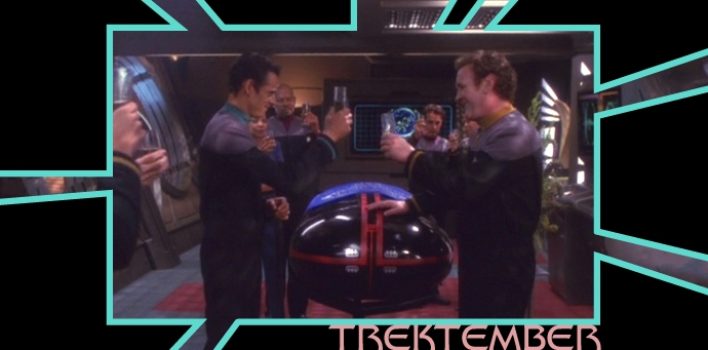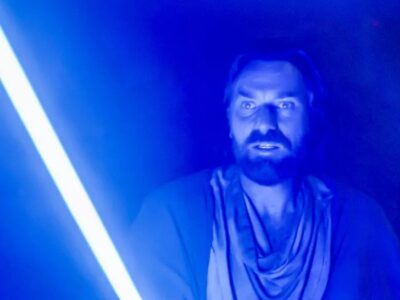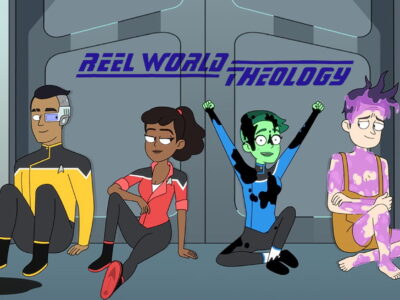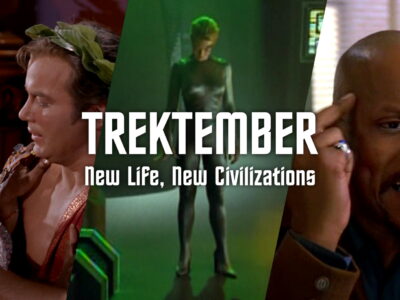Trektember: The Sound of Her Voice
Star Trek doesn’t do ghost stories very often. In an intentionally pro-science, anti-supernatural universe, the unusual always has an explanation; gods are advanced shape-shifters, prophets are nonlinear aliens living inside a wormhole, and spirits do not haunt our heroes.
This just means that the writers of Trek have to get creative to tell those sorts of tales. Eschewing hauntings for mysterious distress signals; abandoning rattling chains for the static of radio distortion; and trading the incorporeal spirit of a dead person for…well, it’s complicated.
Stay, Illusion!
Since the early days of ghost stories, spectres have been used to reflect something important about a living character. The ghosts Odysseus encounters after leaving Circe’s palace in The Odyssey examine and reflect important fears and aspects of the hero’s identity. Hamlet’s father Hamlet’s ghost in Hamlet (son of Hamlet, no doubt) was used by Shakespeare to illuminate his taciturn hero’s true character. This reality can be seen more explicitly in Disney’s remake of Hamlet, The Lion King, where Mufasa’s ghost urges his son Simba, “remember who you are.” Ghosts show our fears and concerns; they illuminate where we’ve fallen short, or failed entirely; they give us insight into where we need to grow and how we can become more.
The Deep Space Nine writing team found a scientific bit of Treknobabble that would let their characters communicate with a “ghost” of sorts over the radio; and, according to the director of this episode, they used Captain Lisa Cusack for exactly the same purpose.
How do you see the moon? You see it because something else, the sun, puts out light that illuminates it. And in “The Sound of Her Voice”, a voice illuminates the characters on the USS Defiant. They go into themselves and bring out their own problems, their own baggage, and present them to the other person, so we see their reflections.
—Winrich Kolbe
The characters know themselves better via this voice from the past; and while the story almost plays it off like Cusak’s death and timeshifting is an afterthought, it’s actually core to understanding the story.
Remember Who You Are
Sisko, O’Brien, and Bashir are the most affected by their encounter with Cusak. The ravages of war have stripped Sisko of his love for those around them; they’ve scared O’Brien away from investing in his friendships; and they’ve made Bashir distant and uncaring about those around him. All three of them needed truth in order to move forward in a healthy way, and they all got it from this voice on the subspace radio.
To me, that’s fascinating. It was a very deeply psychological show, because the characters don’t know the person they’re talking to. I wanted them to bare their souls, to have them tell us their inner feelings through this device of talking to an unknown, unseen person.
—Winrich Kolbe
They couldn’t have heard these truths from anyone around them; they needed someone outside the war, and the only way to get that was to go to the past. Moreover, they needed to talk to their past in order to remember what was truly important.
If you do the math, counting three years back from when the Defiant received Cusak’s message to the year of her death, she died before the Dominion was discovered by Starfleet; and she left on her long-term mission into deep space before Jean-Luc Picard took command of the USS Enterprise at the beginning of Star Trek: The Next Generation. Cusak is a fond memory of a more hopeful past; before Q, before the Borg, before things got complicated.
She’s never heard of the Dominion before; she doesn’t know, can’t know, what destruction this anti-Federation has wrought in the Alpha Quadrant or the minds of its inhabitants; so she can remind them what they’re fighting for—love, friendship, and caring. Even as the Dominion seeks to undermine the Federation’s heart and soul, making it lose that hopeful certainty, Captain Cusak is the anti-Dominion; freely offering love without seeing its object, friendship without any hint of pretense, care even in a dire situation when she is the one who should be cared for.
She represents the hopefulness and caring of the pre-Dominon Alpha Quadrant; she reminds Sisko, O’Brien, and Bashir what life is supposed to be like, before the Founders entered their world. Only a voice from their past can tell them who they’re supposed to be.
A Voice from the Past
The Bible, too, is a mirror through which we see ourselves. Though, far from being undead, the Bible is alive; these words from the past, written by hands buried before we were born, are nevertheless written for us. They reveal who we are, and our way forward. But perhaps most crucially, the Bible tells us what life was supposed to be like before the Fall; before sin entered the world. They show us our past.
All of the pain and loss we experience come from that sin entering the world. We aren’t supposed to face pain or death; we aren’t supposed to experience broken relationships or weakness or lies. The Bible reminds us what it was supposed to be, giving us the hope to pursue that perfection again and the perseverance to keep going when it doesn’t feel like it’s close. It shows us the value of love, of friendship, of caring; and, through Jesus, it empowers us to live those values out.
And God saw everything that he had made, and behold, it was very good. And there was evening and there was morning, the sixth day. Thus the heavens and the earth were finished, and all the host of them.
—Genesis 1:31-2:1, ESV
For I consider that the sufferings of this present time are not worth comparing with the glory that is to be revealed to us. For the creation waits with eager longing for the revealing of the sons of God […to be] set free from its bondage to corruption and obtain the freedom of the glory of the children of God.
—Romans 8:18-19, 21, ESV
For Sisko, O’Brien, and Bashir, things are about to get worse before they get better; very soon, they’ll lose someone close to them. The Dominion War is about to step up, and the ravages of that war are going to be painful. But I like to think that remembering back to the truth Captain Cusak illuminated in their hearts will help them keep going.
Knowledge informs. Truth illuminates. And by that illumination, we can see ourselves.
• • •
Editor’s note: The editors and staff at Reel World Theology were saddened to hear of Aron Eisenberg’s passing last weekend. Eisenberg played the Ferengi Nog in Star Trek: Deep Space Nine, a role with which he won over the hearts of many in the Star Trek fan community, and was, by all accounts, a wonderful person to be around; Armin Shimerman called him “a man of conviction and enormous sensitivity and the best of humanity.” Our prayers go out to his family and friends, particularly to his wife Malíssa Longo and his sons Nicholas and Christopher.
Though this year’s Trektember articles were written before this loss, our upcoming piece about “It’s Only a Paper Moon” will address Eisenberg’s passing.







